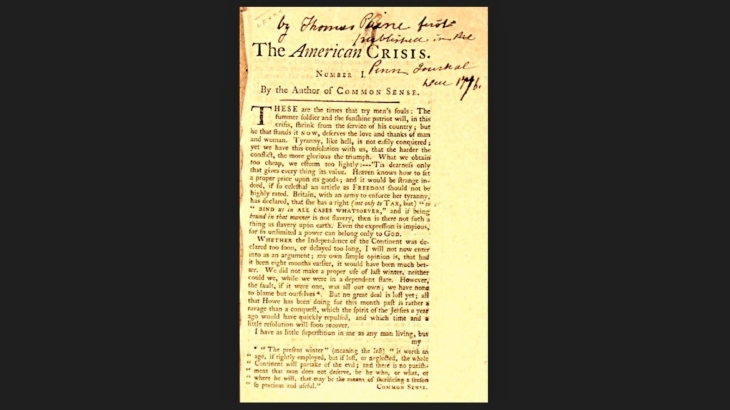Principle of Foreign Policy Based on a Standard of Freedom and Independence
 Essay Read by Constituting America Founder, Actress Janine Turner
Essay Read by Constituting America Founder, Actress Janine Turner
Thomas Paine, in The American Crisis, December 19, 1776, Pamphlet 1, in his speech on “These are the times that try men’s souls” – not quitting in their fight for independence, writing how tyranny is not easily conquered, “Britain, with an army to enforce her tyranny, has declared that she has a right (not only to tax) but “to bind us in all cases whatsoever.”
The same principles that breathed life into Thomas Paine’s resistance to tyranny and justified the American Revolution also formed the basis of the American sense of justice in foreign policy after 1776. The American founders believed that the guides derived from the principles of the Declaration of Independence would better enable them to formulate policies that would satisfy the demands of interest and justice – that is, that would do justice to our own citizens by securing their rights, but would also do justice to foreign people by respecting their independence. In essays #17 and #18 we saw that, according to the principles of the American Founding, the American people have a right to domestic sovereignty and political independence; and because government has a moral obligation to secure the rights of its citizens, the government of the United States has a duty to preserve the nation’s political independence. These same principles provided further guides that would help American statesmen do a better job of securing justice for our nation and doing justice to others as well.
American statesmen believed, first of all, that when possible, peaceful means to resolve conflicts with other nations should be preferred. The founders practiced the doctrine of “peaceful appeals when possible” in the American Revolution itself, by making every possible appeal to the King for a peaceful resolution to the conflict before resigning themselves to an appeal to heaven. The manner in which Americans came to declare the British to be not only a foreign people but enemies was a long process involving many attempts to reconcile differences peacefully. After the “long train of abuses” detailed in the list of grievances against the British, for example, the Declaration of Independence emphasized that “in every stage of these oppressions we have petitioned for redress in the most humble terms: Our repeated petitions have been answered only by repeated injury.” In 1775 the Continental Congress had issued the “Olive Branch Petition” to King George III in 1775 in a last effort to persuade him to come to his senses, stop further bloodshed, and prevent the escalation of hostilities.[1] The appeal to the King was unanswered, and so the Americans were forced to make the “Appeal to Heaven” through a resort to arms and, eventually, by declaring independence.
Second, Founding-era statesmen believed that the United States should respect the equal right of other nations to political independence as much as possible. The right to political independence, derived from the fundamental “Laws of Nature and of Nature’s God,” is a universal right, not an exclusive right of the people of the United States. This right to political independence, therefore, also means that the United States should respect the political independence and domestic sovereignty of all other nations as much as our own security will permit. Just as we expect other nations to respect the independence and domestic sovereignty of the United States as much as their sense of security will allow, we are also obligated to respect the independence of all peoples and their right to consent to their own choice of government, laws, and policies as much as our own sense of security will allow. We see this axiom expressed very clearly in James Kent’s Commentaries on American Law in 1826:
Nations are equal in respect to each other. . . . [T]his perfect equality, and entire independence of all distinct states, is a fundamental principle of public law. It is a necessary consequence of this equality, that each nation has a right to govern itself as it may think proper, and no one nation is entitled to dictate a form of government, or religion, or a course of internal policy, to another.[2]
The American founders believed that by following these two fundamental principles – preferring peaceful measures and respecting the independence and sovereignty of other nations, as much as possible – the United States would avoid giving just cause for war to other nations. This end would also be promoted by performing our engagements, fulfilling treaty obligations, paying debts, and showing little or no favoritism toward particular nations.
We can see these basic principles of American foreign policy thought displayed in many symbolic images. For example, the Gadsden flags popular during the American Revolution portrayed a rattlesnake with the words “Don’t tread on me” on them. This signified America’s willingness, like the rattlesnake, to leave others alone when not threatened; but it also showed the willingness of the United States to strike powerfully and quickly when “meddled with.” This also reflects the claim in the Declaration of Independence that “we hold the rest of mankind, Enemies in War, in Peace Friends.”
 Christopher C. Burkett is Associate Professor of History and Political Science, and Director of the Ashbrook Scholar Program at Ashland University.
Christopher C. Burkett is Associate Professor of History and Political Science, and Director of the Ashbrook Scholar Program at Ashland University.
[1] Continental Congress, “The Last Address of the People of America to the King,” 5-8 July 1775.
[2] James Kent, Commentaries on American Law, 1826.
Click here for First Principles of the American Founding 90-Day Study Schedule.
Click here to receive our Daily 90-Day Study Essay emailed directly to your inbox.




Join the discussion! Post your comments below.
Your feedback and insights are welcome.Feel free to contribute!